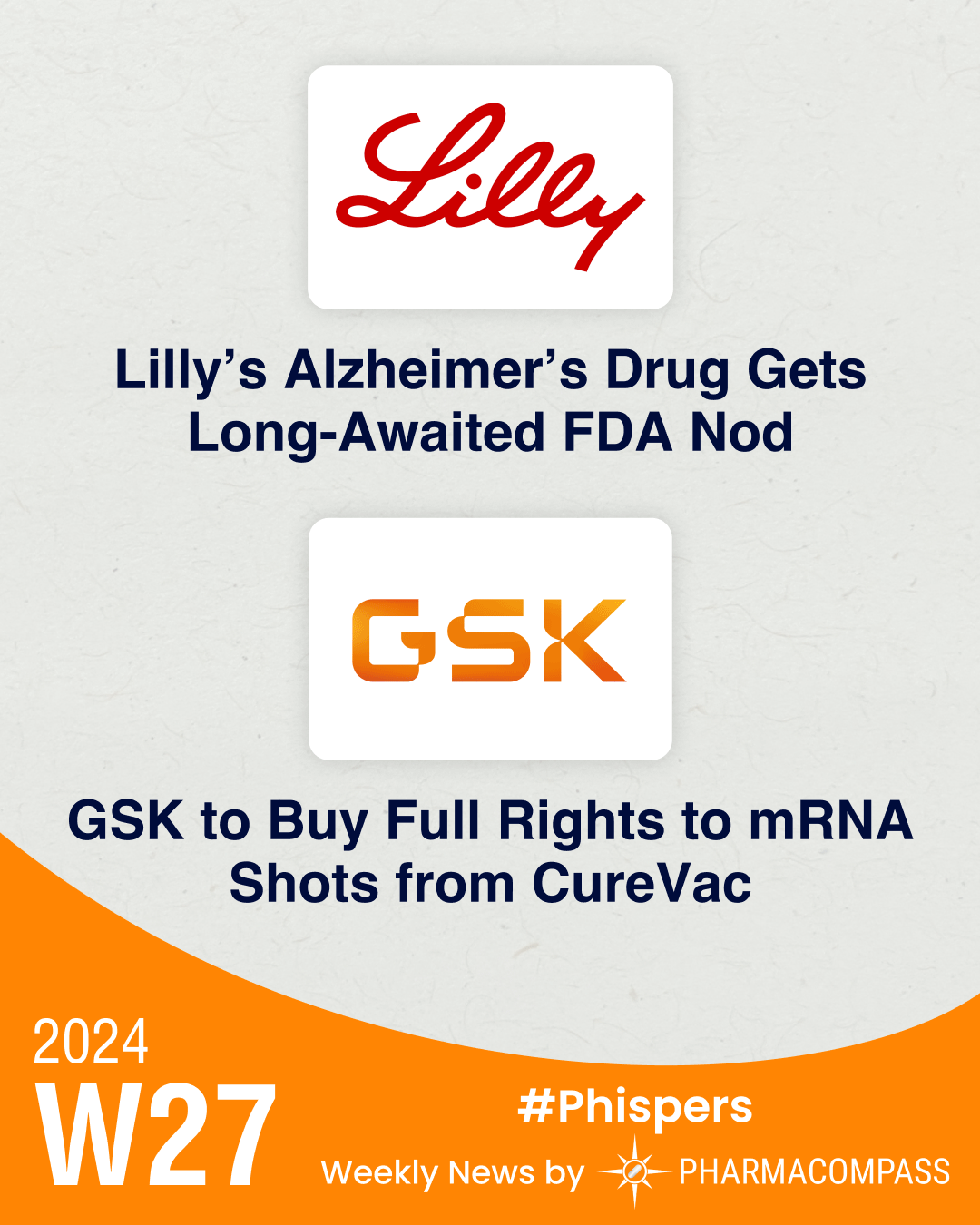
By PharmaCompass
2024-07-04
Impressions: 1,093 Article || 2 Video
This week, the US Food and Drug Administration (FDA) finally approved Eli Lilly’s Alzheimer’s drug donanemab after a long wait. Lilly also inked a radiopharma deal this week, and paid US$ 140 million for the option to acquire Radionetics Oncology for US$ 1 billion.
GSK has struck a deal to buy the rights to Curevac’s Covid-19 and flu vaccines for up to € 1.45 billion (US$ 1.56 billion). Sanofi is investing up to US$ 1.6 billion in Frankfurt to boost production of its long-acting insulin shots.
As part of its portfolio reprioritization, Bristol Myers Squibb has walked away from the rights to the antibody-drug-conjugate (ADC) farletuzumab ecteribulin after having paid Eisai US$ 650 million.
A study published in JAMA Ophthalmology suggests that Novo Nordisk’s Ozempic and Wegovy may have increased the risk of developing a rare, sight-threatening eye condition.
The US Supreme Court has rejected a US$ 6 billion bankruptcy settlement of OxyContin maker Purdue Pharma. European regulators have become the first in the world to approve Sanofi’s Dupixent to treat chronic obstructive pulmonary disease (COPD).
And in regulatory news, FDA has reprimanded India’s Sun Pharma in a warning letter for “significant violations of Current Good Manufacturing Practice (CGMP) regulations” at its Dadra (western India) facility.
Lilly’s Alzheimer’s drug gets FDA nod after months of delay, to get Medicare coverage
FDA has approved Alzheimer’s drug donanemab, to be sold under the brand name Kisunla. It was a long-awaited win for Lilly after the US agency surprised the Alzheimer’s community in March when it delayed approving donanemab on its action date. Last month, an FDA advisory committee voted unanimously in favor of the drug’s benefits outweighing its risks. This approval, and that of Biogen and Eisai’s Leqembi (lecanemab) last year, mark successes in treating the mind-wasting disease after three decades of failed efforts.
Kisunla is a monoclonal antibody infusion administered every four weeks and will cost US$ 32,000 a year compared to US$ 26,500 for Leqembi. Both work by clearing a protein called beta amyloid from the brain. The drug is expected to be covered by Medicare.
In deal with Radionetics, with option to buy it out: Eli Lilly has paid Radionetics Oncology US$ 140 million for the exclusive right to acquire the San Diego-based biotech for US$ 1 billion. Radionetics discovers and develops small molecule radiopharmaceuticals. As part of the option agreement, privately-held Radionetics will continue building its radiopharma drug pipeline through an “exercise period”. Lilly then can choose to acquire the company. This is the third radiopharma deal Lilly has struck in the recent past. In May, it had inked a potential US$ 1.16 billion deal with Aktis Oncology, and late last year, it had bought out Point Biopharma Global for up to US$ 1.4 billion.
GSK restructures deal with CureVac, to buy rights to mRNA jabs for US$ 1.56 bn
Since 2020, GSK and CureVac have worked together to develop mRNA vaccines. But now, the two companies have restructured their existing collaboration into a new licensing agreement. Under the terms of the new agreement, GSK will now acquire full rights to develop, manufacture and commercialize mRNA candidate vaccines for influenza and Covid-19, including combinations, for € 400 million (US$ 430 million) upfront and € 1.05 billion (US$ 1.13 billion) in contingent payments.
Sanofi to invest US$ 1.6 bn in Germany: Sanofi is reportedly planning to invest € 1.3 billion to € 1.5 billion (US$ 1.4 billion to US$ 1.6 billion) in Germany to upgrade its production of long-acting insulin shots. The news was reported by German newspaper Handelsblatt.
Samsung Bio inks its biggest contract ever: A public disclosure shows Korean CDMO giant Samsung Biologics has inked a US$ 1.06 billion agreement with an unnamed US pharmaceutical company. Details were sparse but the deal is Samsung Bio’s biggest contract ever, representing over 39 percent of its total sales in 2023 (about US$ 2.7 billion).
BMS walks away from ADC pact with Eisai after paying US$ 650 mn
BMS is walking away from its rights to the ADC farletuzumab ecteribulin (FZEC) after having paid Japanese drugmaker Eisai US$ 650 million. As part of its portfolio reprioritization, BMS decided to end the co-development agreement. In 2021, the New Jersey-based drugmaker had promised Eisai up to US$ 2.5 billion in milestone payments above a US$ 450 million upfront payment and US$ 200 million in R&D support.
Eisai developing dementia drug for US market: Eisai is reportedly developing a dementia treatment with the goal to commercialize it in the US market by 2030. The drug will work by targeting the tau protein, which causes symptoms of Alzheimer’s disease.
Wegovy, Ozempic linked with condition that causes blindness, suggests study
People taking Novo Nordisk’s Ozempic or Wegovy (both semaglutide) may have an increased risk of developing a rare sight-threatening eye condition, known as non-arteritic anterior ischemic optic neuropathy (NAION), suggests a study published in JAMA Ophthalmology. NAION is a kind of eye stroke that results in a sudden, painless loss of vision in one eye. However, the authors stressed that the results aren’t conclusive, and more studies are needed to confirm a link between sight problems and the popular blockbuster drugs.
EU first off the block to clear Sanofi’s Dupixent as add-on therapy for COPD
European regulators have become the first in the world to approve Dupixent (dupilumab) as an add-on therapy for COPD patients with high levels of certain white blood cells. Sanofi’s blockbuster significantly reduced exacerbations, improved lung function and also improved health-related quality of life. FDA’s deadline for reviewing Dupixent in COPD is September 27, after the agency delayed its decision by three months demanding more efficacy data.
India’s Sun Pharma hit with FDA warning letter for significant CGMP violations
FDA has reprimanded India’s Sun Pharma in a warning letter for “significant violations of Current Good Manufacturing Practice (CGMP) regulations”. The company’s facility in Dadra (western India) failed to adequately clean, maintain and appropriately sanitize and/or sterilize equipment and utensils at proper intervals, FDA said. Sun Pharma was given 15 working days to respond.
US Supreme Court rejects US$ 6 bn opioid deal that shielded Purdue’s Sackler family
The US Supreme Court has struck down a bankruptcy settlement of OxyContin maker Purdue Pharma, which would have offered broad protections to its owners, the wealthy Sackler family. The prescription painkiller OxyContin is considered to have started America’s opioid epidemic, which has claimed the lives of hundreds of thousands since OxyContin was launched in 1996.
The PharmaCompass Newsletter – Sign Up, Stay Ahead
Feedback, help us to improve. Click here
Image Credit : Phisper Infographic by PharmaCompass license under CC BY 2.0
“ The article is based on the information available in public and which the author believes to be true. The author is not disseminating any information, which the author believes or knows, is confidential or in conflict with the privacy of any person. The views expressed or information supplied through this article is mere opinion and observation of the author. The author does not intend to defame, insult or, cause loss or damage to anyone, in any manner, through this article.”








